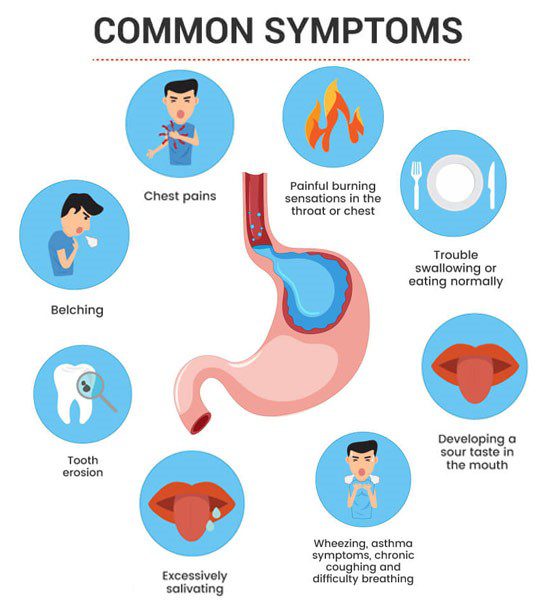
Acid reflux and indigestion are common digestive issues that can cause discomfort and disrupt daily life. Whether it’s occasional heartburn after a heavy meal or chronic acid reflux, understanding the causes and adopting effective management strategies can significantly improve symptoms and overall digestive health. This blog explores various methods to deal with acid reflux and indigestion, including lifestyle changes, dietary adjustments, home remedies, and medical treatments like Aciloc 150 dosage.
Understanding Acid Reflux and Indigestion:
Acid Reflux: Also known as gastroesophageal reflux disease (GERD), acid reflux occurs when stomach acid or bile flows back into the esophagus, causing irritation and inflammation. Common symptoms include heartburn (a burning sensation in the chest), regurgitation of sour or bitter-tasting acid into the throat, and difficulty swallowing.
Indigestion: Also referred to as dyspepsia, indigestion is characterized by discomfort or pain in the upper abdomen, often accompanied by bloating, belching, nausea, and feeling full quickly during meals. Buy ranitidine 150 mg online belongs to the class of gastrointestinal agents. It is used to treat indigestion, heartburn and acid reflux.
Lifestyle Changes:
- Maintain a Healthy Weight: Excess weight, especially around the abdomen, can put pressure on the stomach and promote acid reflux. Losing weight through a balanced diet and regular exercise can reduce symptoms.
- Eat Smaller, More Frequent Meals: Large meals can trigger acid reflux. Opt for smaller portions and eat more frequently throughout the day to ease digestion and reduce pressure on the stomach.
- Avoid Trigger Foods: Certain foods and beverages can exacerbate acid reflux and indigestion. Common triggers include spicy foods, citrus fruits, tomatoes, chocolate, caffeine, alcohol, and carbonated drinks. Identify and limit or avoid triggers that worsen your symptoms.
- Don’t Lie Down After Eating: Wait at least 2-3 hours after eating before lying down or going to bed. This allows gravity to help keep stomach acid in the stomach.
- Elevate the Head of Your Bed: Use bed risers to elevate the head of your bed 6-8 inches. This slight incline can help prevent stomach acid from refluxing into the esophagus during sleep.
- Quit Smoking: Smoking can weaken the lower esophageal sphincter (LES), the muscle that normally prevents acid reflux. Quitting smoking can improve symptoms of acid reflux and overall health.
Dietary Adjustments:
- Fiber-Rich Foods: High-fiber foods like fruits, vegetables, and whole grains can help regulate digestion and prevent constipation, which can contribute to acid reflux.
- Lean Proteins: Opt for lean meats, poultry, fish, and plant-based proteins like tofu and legumes, which are easier to digest and less likely to trigger acid reflux.
- Healthy Fats: Choose healthy fats such as olive oil, avocados, and nuts over saturated fats and trans fats, which can worsen indigestion.
- Avoid Eating Before Bed: Allow at least 2-3 hours between your last meal or snack and bedtime to give your stomach time to digest food properly.
- Stay Hydrated: Drink plenty of water throughout the day to aid digestion and prevent dehydration, which can worsen indigestion symptoms.
Home Remedies:
- Chew Gum: Chewing sugar-free gum after meals can stimulate saliva production, which helps neutralize stomach acid and relieve symptoms of acid reflux.
- Baking Soda: A teaspoon of baking soda dissolved in a glass of water can temporarily neutralize stomach acid and provide relief from heartburn. Use this sparingly as excessive use can lead to electrolyte imbalances.
- Ginger Tea: Ginger has natural anti-inflammatory properties that can help soothe the stomach and alleviate indigestion. Drink ginger tea or chew on fresh ginger slices.
- Apple Cider Vinegar: Despite its acidic nature, some people find that a tablespoon of diluted apple cider vinegar in water before meals can improve digestion and reduce acid reflux symptoms.
- Marshmallow Root: Marshmallow root tea or supplements may help coat the lining of the esophagus and stomach, providing relief from irritation caused by acid reflux.
Medical Treatments:
- Antacids: Over-the-counter antacids like Tums, Rolaids, or Maalox can neutralize stomach acid and provide quick relief from heartburn and indigestion.
- H2 Receptor Antagonists: Medications such as ranitidine (Zantac) or famotidine (Pepcid) reduce the production of stomach acid, helping to relieve symptoms of acid reflux.
- Proton Pump Inhibitors (PPIs): Prescription-strength medications like omeprazole (Prilosec), lansoprazole (Prevacid), or esomeprazole (Nexium) reduce acid production and promote healing of the esophagus. PPIs are typically used for more severe or persistent cases of acid reflux.
- Prokinetics: These medications help strengthen the lower esophageal sphincter and promote faster emptying of the stomach, reducing the likelihood of acid reflux.
- Surgery: In rare cases where medications and lifestyle changes do not provide adequate relief, surgical procedures such as fundoplication may be considered to strengthen the LES and prevent acid reflux.
When to See a Doctor:
While occasional acid reflux or indigestion is common and often manageable with lifestyle changes and over-the-counter medications, persistent or severe symptoms may require medical evaluation. Seek prompt medical attention if you experience:
- Frequent or severe heartburn: Occurring two or more times per week.
- Difficulty swallowing: A feeling of food sticking in the throat or chest.
- Unexplained weight loss: Significant weight loss without dieting or exercise.
- Persistent nausea or vomiting: Especially if accompanied by blood or black stools.
Conclusion:
Managing acid reflux and indigestion involves a combination of lifestyle modifications, dietary adjustments, home remedies, and sometimes medical treatments to alleviate symptoms and improve digestive health. By identifying triggers, adopting healthy eating habits, and seeking appropriate medical advice when needed, individuals can effectively manage acid reflux and indigestion to enjoy better overall well-being and quality of life. It’s essential to work closely with healthcare providers to develop a personalized treatment plan that addresses your specific symptoms and concerns. With proactive management and consistent self-care, you can minimize the impact of acid reflux and indigestion on your daily life and maintain digestive comfort.
Harry
